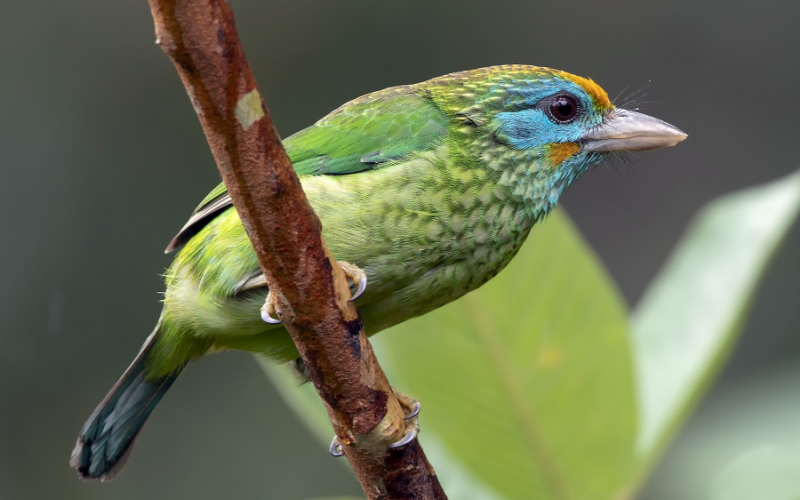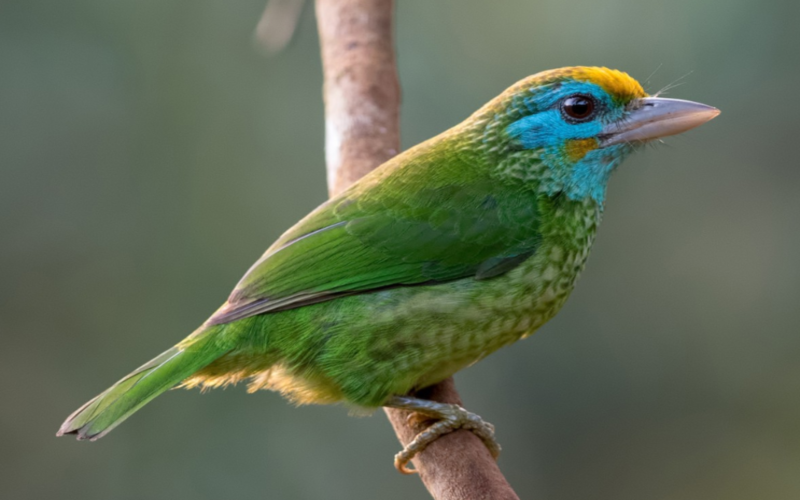The Yellow-fronted Barbet – Sri Lanka
About Yellow-fronted Barbet
Sri Lanka, a small island nation located in the Indian Ocean, is known for its stunning landscapes, rich cultural heritage, and diverse flora and fauna. One of the most fascinating species of birds found in Sri Lanka is the Yellow-fronted Barbet (Megalaima flavifrons), a medium-sized bird with striking colors and a unique personality. In this blog post, we will explore the biology, behavior, and conservation status of the Yellow-fronted Barbet.
Biology and Description of Yellow-fronted Barbet
The Yellow-fronted Barbet belongs to the family of Asian barbets, which are known for their colorful plumage, distinctive calls, and unique nesting habits. The species is endemic to Sri Lanka, meaning it is found nowhere else in the world. It is commonly found in the wet zone forests of Sri Lanka, which provide the ideal habitat for its survival.
The Yellow-fronted Barbet is a medium-sized bird, measuring around 20 centimeters in length and weighing around 80 grams. It has a green body with a yellow forehead, black facial markings, and a distinctive red patch on its throat. Its bill is large and curved, which it uses to forage for food and to excavate nesting cavities in trees.
Behavior and Ecology of Yellow-fronted Barbet
The Yellow-fronted Barbet is a diurnal bird, meaning it is active during the day. It is typically found in pairs or small groups, and is known for its distinctive calls, which sound like “toop toop toop.” These calls are often used to communicate with other members of the group, as well as to defend their territory from other birds.
The species is primarily frugivorous, meaning it feeds on fruits and berries found in the forest canopy. It also feeds on insects and other small invertebrates, which it catches using its bill. The Yellow-fronted Barbet plays an important ecological role in the forest ecosystem as a seed disperser, helping to maintain the diversity of plant species in the forest.

Breeding and Nesting Habits
The Yellow-fronted Barbet is known for its unique nesting habits. It typically excavates a nesting cavity in a dead tree branch or stump using its bill, and lines the cavity with soft materials such as leaves and feathers. The female lays a clutch of around two to three eggs, which she incubates for around two weeks. Both parents take turns incubating the eggs and feeding the chicks once they hatch.
Where You Can Find Yellow-fronted barbet
- Kitulgala Forest
- The Peak Wilderness Reserve
- Bodhinagala Forest
- Bodhinagala Forest
- Sinharaja Rain Forest
- Kanneliya Forest Reserve
- Hiyare Forest Reserve
Conservation Status
The Yellow-fronted Barbet is classified as “Near Threatened” by the International Union for Conservation of Nature (IUCN). The species is threatened by habitat loss due to deforestation, agricultural expansion, and human development. In addition, it is hunted for its meat and captured for the pet trade, further threatening its survival.
Conservation efforts are underway to protect the habitat of the Yellow-fronted Barbet and other endemic bird species in Sri Lanka. These efforts include the establishment of protected areas such as the Sinharaja Forest Reserve and the Horton Plains National Park, as well as conservation programs to raise awareness about the importance of preserving the country’s natural heritage.
Conclusion
The Yellow-fronted Barbet is a fascinating and unique bird species found only in Sri Lanka. With its striking colors, distinctive calls, and unique nesting habits, it is a prized sighting for birdwatchers and nature enthusiasts. However, the species faces threats from habitat loss and human activity, highlighting the urgent need for conservation efforts to protect this remarkable bird and its natural habitat.
As visitors to Sri Lanka, we can all play a role in promoting responsible and sustainable tourism practices that support the conservation








4
Thank you very much for sharing, I learned a lot from your article. Very cool. Thanks.
Thank you so much!